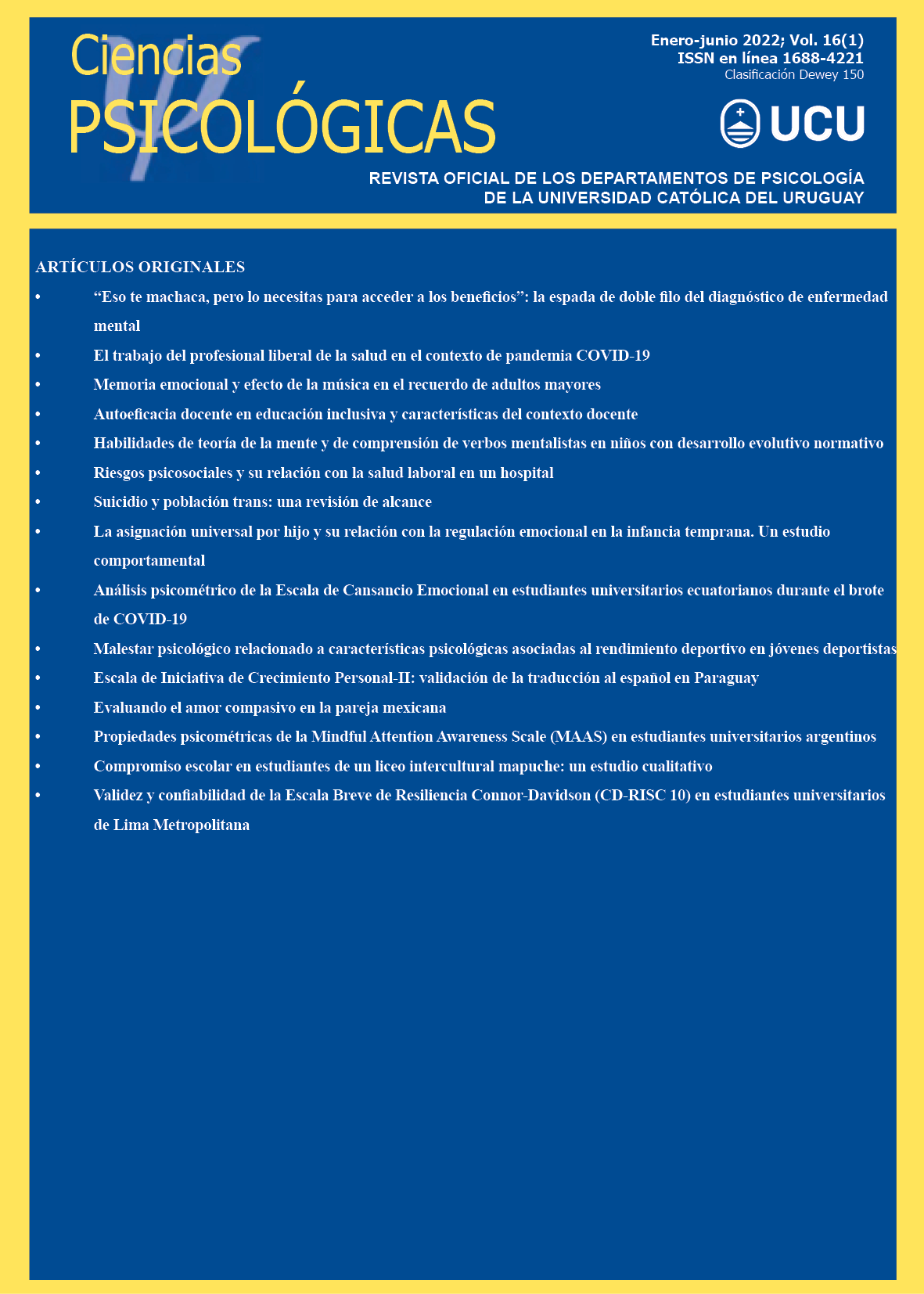Autoeficacia docente en educación inclusiva y características del contexto docente
DOI:
https://doi.org/10.22235/cp.v16i1.2436Palabras clave:
autoeficacia, educación inclusiva, docenteResumen
El objetivo de este estudio fue describir la asociación de la autoeficacia de los docentes en las prácticas educativas inclusivas con las variables del contexto de enseñanza y las características de los docentes. Participaron 193 docentes de educación básica, 77.72 % mujeres y 22.28 % hombres de escuelas privadas, confesionales y públicas estatales ubicadas en los municipios de Belém y Castanhal, Pará, Brasil. Se aplicaron instrumentos de caracterización y la escala de efectividad de los docentes en prácticas educativas inclusivas. Las técnicas de análisis de datos fueron análisis factorial y análisis de correspondencia. Entre los resultados encontrados, se verificaron asociaciones entre las variables investigadas lo que sugiere que, al juzgar su propia capacidad en prácticas educativas inclusivas, el docente considera algunos factores presentes en el contexto y en su trayectoria docente. Se espera que este estudio pueda contribuir a estimular la formación continua de los docentes en un contexto inclusivo.
Descargas
Citas
Bandura, A. (1997). Self-self efficacy: The exercise of control. W. H. Freeman/Times Books/ Henry Holt & Co.
Bandura, A. (2008). Reconstrual of "free will" from the agentic perspective of social cognitive theory. In J. Baer, J. C. Kaufman, & R. F. Baumeister (Eds.), Are we free? Psychology and free will (pp. 86-127). Oxford University Press. https://doi.org/10.1093/acprof:oso/9780195189636.003.0006
Bzuneck, J. A. (2017). Crenças de autoeficácia de professores: um fator motivacional crítico na educação inclusiva. Revista Educação Especial, 30(59), 697-708. https://doi.org/10.5902/1984686X28427
Cardona-Molto, M. C., Ticha, R., & Abery, B. H. (2020). The Spanish Version of the Teacher Efficacy for Inclusive Practice (TEIP) Scale: Adaptation and Psychometric Properties. European Journal of Educational Research, 9(2), 809-823. https://doi.org/10.12973/eu-jer.9.2.809
Carew, M. T., Deluca, M., Groce, N., & Kett, M. (2019). The impact of an inclusive education intervention on teacher preparedness to educate children with disabilities within the Lakes Region of Kenya. International Journal of Inclusive Education, 23(3), 229-244. https://doi.org/10.1080/13603116.2018.1430181
Dimitrios, S., Foteini, C., Harilaos, Z., Victoria, Z., & Panagoula, P. (2020). Self-efficacy of special education teachers in Greece. European Journal of Education Studies, 7(4), 150-160. https://doi.org/10.5281/zenodo.3809401
Fávero, L. P., Belfiore, P., Silva, F. D., & Chan, B. L. (2009). Análise de dados: modelagem multivariada para tomada de decisões. Elsevier.
Kiel, E., Braun, A., Muckenthaler, M., Heimlich, U., & Weiss, S. (2019). Self-efficacy of teachers in inclusive classes. How do teachers with different self-efficacy beliefs differ in implementing inclusion? European Journal of Special Needs Education, 35(3), 1-17. https://doi.org/10.1080/08856257.2019.1683685
Martins, B. A. & Chacon, M. C. M. (2020). Escala de eficácia docente para práticas inclusivas: validação da Teacher efficacy for inclusive Practices (TEIP) scale. Revista Brasileira de Educação Especial, 26(1), 1-16. https://doi.org/10.1590/s1413-65382620000100001
Morettin, P. A. & Bussab, W. O. (2017). Estatística básica. Saraiva Educação SA.
Nina, K. C. F., Silva, S. S. da C., & Pontes, F. A. R. (2020). Adaptação transcultural do The Teacher Efficacy for Inclusive Practices (TEIP): versão brasileira. Ciencias Psicológicas, 14(1), e-2175. https://doi.org/10.22235/cp.v14i1.2175
Nuri, C., Demirok, M. S., & Direktör, C. (2017). Determination of Self-efficacy and Burnout State of Teachers Working in the Special Education Field in Terms of Different Variables. Journal of Education and Training Studies, 5(3), 160. https://doi.org/10.11114/jets.v5i3.2237
Özokcu, O. (2017). Investigating the relationship between teachers’ self -efficacy beliefs and efficacy for inclusion. European Journal of Special Education Research, 2(6), 234-252. https://doi.org/10.5281/zenodo.1133784
Özokcu, O. (2018). Investigating preschool teachers’ self-efficacy in inclusion practices in Turkey. International Education Studies, 11(9), 79. https://doi.org/10.5539/ies.v11n9p79
Ramos, M. F. H., Pontes, F. A. R., Silva, S. S. D. C., Ramos, E. M. L., Casanova, D. C. G., & Azzi, R. G. (2018). Characterization of basic education teachers based on the social cognitive model of job satisfaction. Paideia, 28(69), 1-8. https://doi.org/10.1590/1982-4327e2811
Sharma, U., Loreman, T., & Forlin, C. (2012). Measuring teacher efficacy to implement inclusive practices. Journal of Research in Special Educational Needs, 12(1), 12-21. https://doi.org/10.1111/j.1471-3802.2011.01200.x
Song, J. (2016). Inclusive Education in Japan and Korea – Japanese and Korean Teachers’ Self-Efficacy and Attitudes towards Inclusive Education. Journal of Research in Special Educational Needs, 16, 643-648. https://doi.org/10.1111/1471-3802.12324
Tschannen-Moran, M. & Hoy, A. W. (2001). Teacher efficacy: capturing an elusive construct. Teaching and Teacher Education, 17(7), 783-805. https://doi.org/10.1016/S0742-051X(01)00036-1
Tschannen-Moran, M. & Hoy, A. W. (2007). The differential antecedents of self-efficacy beliefs of novice and experienced teachers. Teaching and Teacher Education, 23(6), 944-956. https://doi.org/10.1016/j.tate.2006.05.003
Tschannen-Moran, M., & Johnson, D. (2011). Exploring literacy teachers’ self-efficacy beliefs: Potential sources at play. Teaching and Teacher Education, 27(4), 751-761.
Tschannen-Moran, M., Hoy, A. W., & Hoy, W. K. (1998). Teacher efficacy: Its meaning and measure. Review of Educational Research, 68(2), 202-248. https://doi.org/10.3102/00346543068002202
Tümkaya, G. S., & Miller, S. (2020). The perceptions of pre and in-service teachers’ self-efficacy regarding inclusive practices: A systematised review. Elementary Education Online, 19(2), 1061-1077. https://doi.org/10.17051/ilkonline.2020.696690
Yada, A. & Savolainen, H. (2017). Japanese in-service teachers’ attitudes toward inclusive education and self-efficacy for inclusive practices. Teaching and Teacher Education, 64, 222-229. https://doi.org/10.1016/j.tate.2017.02.005
Yada, A., Tolvanen, A., & Savolainen, H. (2018). Teachers’ attitudes and self-efficacy on implementing inclusive education in Japan and Finland: A comparative study using multi-group structural equation modelling. Teaching and Teacher Education, 75, 343-355. https://doi.org/10.1016/j.tate.2018.07.011
Yada, A., Tolvanen, A., Malinen, O. P., Imai-Matsumura, K., Shimada, H., Koike, R., & Savolainen, H. (2019). Teachers’ self-efficacy and the sources of efficacy: A cross-cultural investigation in Japan and Finland. Teaching and Teacher Education, 81, 13-24. https://doi.org/10.1016/j.tate.2019.01.014
Descargas
Publicado
Cómo citar
Número
Sección
Licencia
Derechos de autor 2022 Universidad Católica del Uruguay

Esta obra está bajo una licencia internacional Creative Commons Atribución 4.0.
















